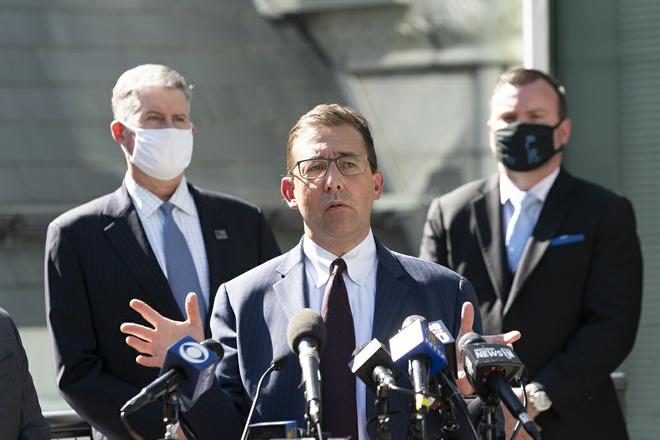Read this article on the original website.
De-Trumpifying all levels of the Department of Justice (DOJ), an agency still suffering from the corruption of the previous administration, remains a critical factor in Joe Biden’s success. President Trump notoriously manipulated U.S. attorneys, firing those he feared would interfere with his businesses and unearth the Trump Organization’s crimes. Though the extent of his administration’s interference remains unknown, Trump’s obvious removal of non-loyalists is indicative of the level of corruption these offices may contain. Urgent structural change is needed, not only to root out potentially incompetent and corrupt figures in U.S. attorneys offices, but to actually advance the values of equity and justice that Biden ultimately embraced in his campaign.
This Sunday marked the deadline for Trump-appointed U.S. attorneys to heed President Biden’s call and offer their resignation. Though circumstances might merit the continuation of a few U.S. attorneys, a number of Trump’s holdovers raise alarm. Concern is particularly warranted in states where Trump either sought to shield his organization from investigation or intervene in the outcome of the 2016 and 2020 presidential-election results.
Seth DuCharme, the acting U.S. attorney for the Eastern District of New York (EDNY), is one such figure. Prior to his promotion last July, DuCharme was working at Main Justice underneath Attorney General William Barr. In the midst of the department’s politicization, DuCharme worked closely with Barr on the investigation into the FBI’s Russia probe, a move that shielded Trump from facing scrutiny on alleged Russian interference in the 2016 presidential election.
As DuCharme revolved in at EDNY, he switched positions with former acting Attorney General Richard P. Donoghue, who previously worked in Barr’s DOJ coordinating investigations involving Ukraine. The Trump administration’s focus on controlling New York’s U.S. attorneys in order to manage investigative risks raises concerns about the potential depth of politicization in these offices and the integrity of political appointees who worked closely with Attorneys General Jeff Sessions and William Barr.
Special attention toward U.S. attorneys in Republican-controlled states where elected officials have expressed sympathy for Trump’s insurrectionists and are engaged in voter suppression is another structural issue Biden must urgently address. Let’s not forget about the DOJ’s FBI-based command center to “watch polling activity” during the 2020 presidential election, which drew outrage from civil rights groups monitoring voter suppression. Trump’s autocratic agenda and manipulation of the department tainted what should have otherwise been routine election monitoring. And the ongoing service of U.S. attorneys in states like Alabama, whose senator Tommy Tuberville supported challenging the 2020 presidential results, casts doubt that these appointees are sufficiently independent from Trump’s authoritarianism.
As always, a lack of congressional oversight makes these situations difficult to assess. Congress and good-governance groups must sound the alarm and investigate the extent of Trump’s corruption of U.S. attorneys, as well as other offices within the DOJ. And U.S. attorneys who rose to the number two position while Sessions or Barr was attorney general should be treated as political appointees, even if they were promoted by Trump’s U.S. attorney themselves, rather than directly by Main Justice.
The replacement of interim U.S. attorneys confirmed by local courts—like Gretchen Shappert of the U.S. Virgin Islands—may take longer, as arguably they hold power until new appointees go through the Senate confirmation process. (It’s actually a complicated, unresolved legal question.) But local Democratic representatives should be consulted by the Biden administration and, together, be ready to nominate qualified candidates for the role. Biden won the presidency four months ago, and Trump’s sustained assault on the rule of law was clear well before the events of January 6th.
Traditionally, U.S. attorney selections require sign-off (or “blue slips”) from each of a state’s senators. Trump frequently evaded this process in states such as New York, where an orthodox appointee posed grave personal risk. The tradition, albeit tattered, does remain. But should it? Should senators like Josh Hawley and Ted Cruz have veto rights over appointees, while members of the House like Sheila Jackson Lee and Cori Bush are denied the ability to offer input?
De-Trumpification need not limit the scope of what Biden can do to reform the Department of Justice. Rather than drawing on the same tough-on-crime prosecutors and corporate-law attorneys who have overwhelmingly controlled U.S. attorneys’ offices for decades, he could look to new sources of talent. A burgeoning movement of reform-minded state and local prosecutors offers one such source. Public defenders, who have experience with the U.S. attorneys’ offices from the other side, would make similarly excellent candidates. Democratic representatives and progressive criminal justice reform networks can offer pipelines to match the president’s ambitious agenda to advance equity and leave a legacy of healing and unity in the wake of four years of terror.
As president, Joe Biden holds a considerable amount of power to change the culture of law enforcement. And he needs an energized and progressive pool of U.S. attorneys to do that. A combination of de-Trumpifying U.S. attorneys offices and nominating candidates who are in line with issues like criminal justice reform, prosecuting white-collar crime, and protecting the environment will be necessary to move from executive orders to structural change.

